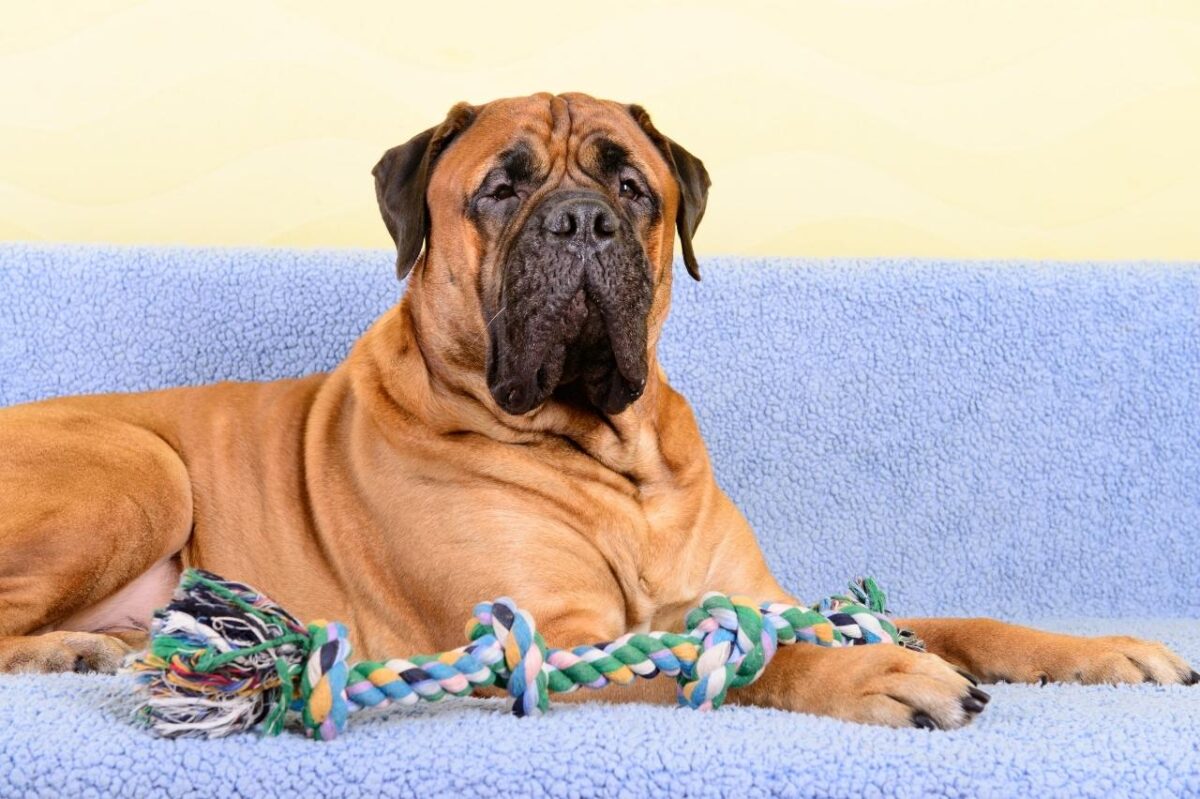
Mastiffs are one of the most impressive and ancient dog breeds, known for their enormous size, strength, and loyalty. However, despite their noble history and gentle demeanor, there are still many misconceptions about Mastiffs that persist to this day. These myths can deter potential dog owners from considering these gentle giants as companions or lead to misunderstandings for those who already have one. To shed light on the truth, here are five myths about Mastiffs you should stop believing.
Myth #1: Mastiffs are Aggressive and Dangerous
One of the most pervasive myths about Mastiffs is that they are naturally aggressive and dangerous because of their size and strength. While it’s true that Mastiffs are powerful dogs, this doesn’t make them inherently aggressive. In fact, Mastiffs are known for their calm, gentle, and loyal temperament. They were originally bred to guard and protect, but over centuries, breeders have refined their demeanor to make them more family-friendly.
Mastiffs, when properly socialized, are known for their protective yet patient nature. They tend to be wary of strangers, which is why they make excellent guard dogs. However, this wariness doesn’t translate into unnecessary aggression. If trained and socialized from a young age, Mastiffs are gentle with children and other pets, often acting as a loving and watchful companion rather than a threat.
It’s essential for any dog, especially a large breed like the Mastiff, to receive consistent training and positive reinforcement. This ensures that their natural protective instincts are channeled appropriately without fostering any negative or aggressive behaviors. Responsible ownership and early socialization are the keys to ensuring a well-behaved Mastiff.
Myth #2: Mastiffs Don’t Need Much Exercise
Due to their large size, some people assume that Mastiffs are lazy dogs that don’t require much physical activity. While it’s true that they aren’t as hyperactive as some smaller breeds, this doesn’t mean they can skip out on exercise. Mastiffs still need regular physical activity to maintain their health and prevent obesity, which can lead to joint issues and other health problems.
Mastiffs tend to have lower energy levels compared to high-energy breeds like Border Collies or Jack Russell Terriers, but they still need daily walks and mental stimulation. Regular, moderate exercise helps keep them physically fit and mentally engaged. Without sufficient activity, Mastiffs can become bored, which may lead to destructive behaviors.
Owners should be mindful of their Mastiff’s exercise needs, ensuring they don’t over-exert the dog, especially during hot weather, as Mastiffs are prone to heat exhaustion. A balance of daily walks, light play sessions, and mental challenges such as puzzle toys will keep a Mastiff happy and healthy.
Myth #3: Mastiffs are Difficult to Train
Another common myth is that Mastiffs are stubborn and difficult to train. While Mastiffs do have an independent streak, they are also highly intelligent and eager to please their owners. The key to training a Mastiff is patience, consistency, and positive reinforcement.
Mastiffs respond well to gentle and consistent training methods. Harsh corrections or punishment-based training will not only be ineffective but can damage the bond between the owner and the dog. Mastiffs are sensitive dogs that thrive on positive reinforcement, praise, and treats when they do well.
Early training and socialization are crucial for Mastiffs, given their size and strength. Basic obedience commands like sit, stay, and come are essential for managing them in everyday situations. With the right approach, Mastiffs can excel in training and even take part in activities like therapy work or obedience competitions.
Myth #4: Mastiffs Don’t Make Good Family Pets
Because of their imposing size, some people believe that Mastiffs are not suited for family life, especially in homes with children. However, this couldn’t be further from the truth. Mastiffs are known for their gentle and protective nature, making them wonderful family pets.
Mastiffs are often referred to as “gentle giants” because of their calm demeanor and deep bond with their families. They are known to be extremely patient with children, often tolerating rough play with a calm attitude. Their protective instincts also make them excellent guardians of the home, always keeping a watchful eye on their family members.
However, due to their size, supervision is necessary when they are around very young children to prevent any accidental knocks or bumps. Mastiffs are not known to be overly rambunctious, but their sheer size means they can unintentionally knock over small kids. Teaching both the dog and the children to interact gently and respectfully ensures a harmonious household.
Myth #5: Mastiffs are Unhealthy and Have a Short Lifespan
It’s a common misconception that Mastiffs are plagued by health issues and have extremely short lifespans. While Mastiffs, like many large breeds, are susceptible to certain health problems, they are not necessarily destined for a short or unhealthy life.
Mastiffs can live a healthy life when provided with proper care, including a balanced diet, regular exercise, and routine veterinary check-ups. Some of the health issues that Mastiffs can be prone to include hip dysplasia, bloat, and certain heart conditions, but responsible breeding and good veterinary care can significantly reduce the risks.
A well-cared-for Mastiff can live anywhere between 6 and 10 years, with some living even longer. Regular vet visits, a healthy diet, and appropriate exercise can help manage potential health issues and ensure that your Mastiff lives a full, healthy life. It’s also important for prospective owners to work with reputable breeders who screen for genetic conditions, further ensuring the health of their future companion.
Conclusion
Mastiffs may be large and powerful, but they are also gentle, loyal, and loving dogs. These myths about Mastiffs, whether about their temperament, exercise needs, or suitability as family pets, are based on misunderstandings that don’t reflect the true nature of the breed. With the right care, training, and socialization, Mastiffs make wonderful companions and guardians, embodying the term “gentle giant.”
If you’re considering adding a Mastiff to your family, remember that proper training, socialization, and care will lead to a rewarding relationship with one of the most noble and loving dog breeds around. Don’t let these myths cloud your judgment—Mastiffs are more than capable of being excellent family pets and lifelong companions.



